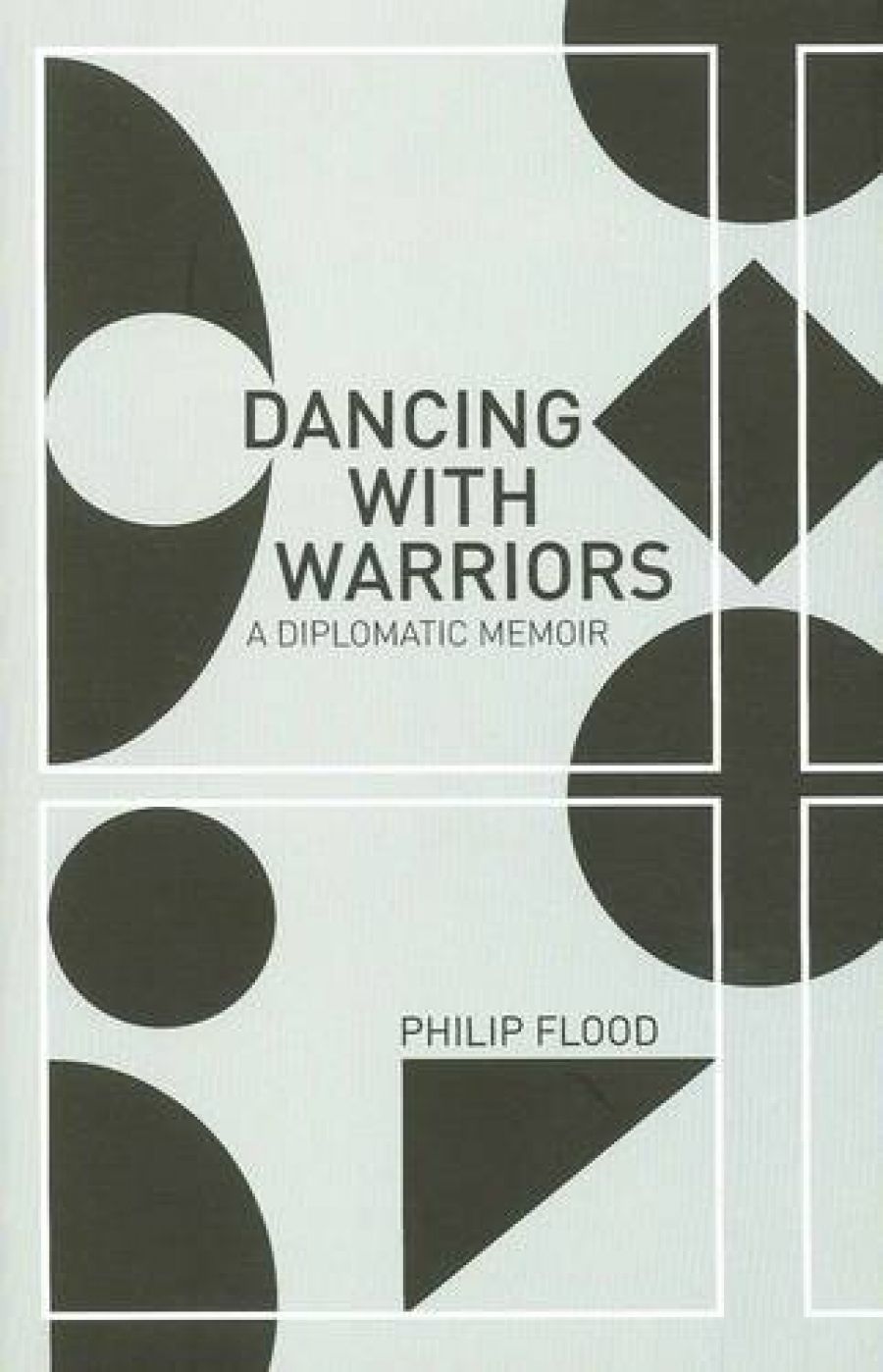
- Free Article: No
- Contents Category: Memoir
- Review Article: Yes
- Online Only: No
- Custom Highlight Text:
A current view among foreign policy academics is that the pursuit of Australia’s foreign interests is too important to be left to the diplomats. Here is a timely antidote from Philip Flood, an Australian diplomat who distinguished himself as a maker and shaper of foreign policy, particularly in South-East Asia.'
- Book 1 Title: Dancing with Warriors
- Book 1 Biblio: Australian Scholarly Publishing, $39.95 hb, 383 pp
Flood was an outstanding product of the New South Wales public school system. In his final year at North Sydney Boys High, he tied for top spot in the state in mathematics, and went on to study economics and auditing, utilitarian qualifications he effectively deployed in his career.
Flood, it seems, is always in the right place at the right time. During the International Geophysical Year of 1961 he is in Brussels, where he helps negotiate Australia’s ambitious territorial claims in the Antarctic. In 1966 he is in Paris to help secure Australian membership of the Development Assistance Committee of the Organisation for Economic Co-operation and Development. In 1970 he is in Tokyo with Prime Minister William McMahon to help shape Australia’s substantial increases in Australian aid to Indonesia, Vietnam, and Cambodia. In 1973 he goes to China with Prime Minister Gough Whitlam, a spectacularly successful visit that ends the previous Liberal government’s fiction that the government of China is in Taipei.
Flood’s first posting as head of mission is to Bangladesh in 1974, a poor, scarred, shattered country separated from Pakistan in 1971. While admitting that aid is no panacea, he persuades Canberra to initiate a generous aid program, which is quickly emulated by other donor countries.
In 1976 Flood is transferred to Washington as deputy head of mission. While rehearsing the mantra of why relations with the United States are of paramount importance to Australia, he allows himself some wry observations about the differences in national temperament: Australian foreign policy is not infused with US evangelism; we have no special relationship with God, and no divine mission to lead the world. Later, he sensibly observes that it would be foolish to assume that it will always be in America’s interests to assist Australian security in all contingencies. He notes that Prime Minister Malcolm Fraser surprised President Ford and Secretary of State Kissinger by objecting to Washington’s dangerous drift of tolerance towards the Soviet Union through détente. The Americans, Fraser argued, should have been a lot tougher.
In times of global recession and growing agricultural protection, Flood engages increasingly in trade negotiations – by trying to keep access open in US markets for beef and sugar, and then, as CEO in 1977 to Special Trade Negotiator John Howard, to maintain access for Australian butter, cheese, beef, wheat, sugar, and fruit in European markets. Towards the end of 1977 he comes home from Washington and spends the next seven years working with Trade Minister Doug Anthony on the same issues.
After a brief period with Peter Wilenski at the Public Service Board, Flood returns in 1985 to Foreign Affairs at Minister Bill Hayden’s invitation, negotiates a joint declaration of principles with Papua New Guinea, and oversees the integration of Foreign Affairs with Trade into one department under two ministers.
Flood is Ambassador to Indonesia for four years from 1989. He arrives in Jakarta when bilateral relations have been eroded by a history of brutal Indonesian behaviour: excessive confrontation, the incorporation of Irian Jaya into Indonesia, human rights abuses by Indonesian armed forces, the 1975 Indonesian invasion of East Timor, and the death of five Australian journalists, the Balibo Five. But he successfully works with Indonesian Foreign Minister Ali Alatas to engage Indonesia’s support for Prime Minister Bob Hawke’s APEC initiative, improve defence cooperation, negotiate a Timor Sea boundary, and make more stringent the detention terms accorded Indonesians caught fishing illegally in Australian waters. Somehow he engineers a successful visit to Jakarta by Prime Minister Paul Keating in April 1992, a few months after the massacre by Indonesian soldiers of East Timorese in the Santa Cruz cemetery in Dili.
Flood becomes Director General of the Australian Aid Bureau in 1993, and renames it AusAID, before Howard appoints him as Secretary of the Department of Foreign Affairs and Trade in 1996. Under its new, initially bumbling, Foreign Minister Alexander Downer, he adroitly manages Howard’s hard-headed foreign policy. Australian commercial interests are the new bottom line, and Australia’s Asian relations are subordinate to those with Washington. He is rewarded in 1998 by a posting as High Commissioner to London, and enlivens his narrative with some diverting stories about Rugby and Cricket World Cups, Wimbledon, the queen’s response to growing Australian republicanism, and a banquet in October 1999 at Buckingham Palace for the Chinese president, Jiang Zemin. He doesn’t say so, but one can safely assume that the highlight of his posting was the July 2000 celebrations marking the centenary of Federation.
Flood ends his narrative with some passionately held convictions about Australia’s future. These sensibly include the urgent need for greater efforts to understand Asian cultures and languages, and for a foreign service with sufficient resources (it has the talent) to manage the growing power of China and India in Asia and the diminishing power of the United States. He shows that the degradation of Australia’s Foreign Service began under Downer, and, surprisingly, given his DFAT background, continued under Kevin Rudd. This book might help persuade Rudd and whoever succeeds him to have second thoughts about continually making cuts to DFAT’s budget.


Comments powered by CComment